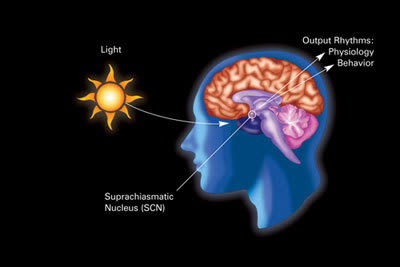Is Winter in Portland Making Us Sleepier?

Image: Shutterstock
It’s already November, and if you’ve been feeling a whole lot groggier during these brief autumn days, you’re not alone. As it turns out, the reduced amount of daylight that begins around this time of the year has some very real effects on our internal clocks.
Our brains and bodies are regulated by cycles known as circadian rhythms, which affect everything from our sleep cycle to digestion, hormone production, and blood pressure, as well as mood and cognitive activity. These rhythms are largely genetic, but are also determined to a considerable degree by environmental factors like light and temperature. We can see these external factors trigger physical responses in other animals as well, such as migratory bird species. It makes sense, then, that these abrupt and dramatic seasonal changes also result in a shock to our biological clocks as our circadian rhythms adjust to the new winter conditions.
The human body’s biological clock system is rooted in a small cluster of cells within the brain known as the suprachiasmatic nucleus, or SCN. “The body's master clock, or SCN, controls the production of melatonin, a hormone that makes you sleepy,” explains the National Institute of General Medical Sciences. “Since it is located just above the optic nerves, which relay information from the eyes to the brain, the SCN receives information about incoming light. When there is less light—like at night—the SCN tells the brain to make more melatonin so you get drowsy.”

Conversely, when the brain is exposed to more light—particularly artificial light from electronics—it can drastically affect and alter the brain’s natural alarm system that alerts the body when it’s time to go to sleep. So, as the seasons change and our biological clocks change with them, try these simple tips from Daniel Root, M.D, of Oregon Sleep Associates to quickly readjust your internal rhythms and enjoy a well-rested winter:
- Establish a regular wake-up time: Hitting snooze 75 times is oh-so-tempting, but if you wake up at the same time every day, your body will learn to naturally wake up at the correct time without those annoying alarms.
- Eat earlier: Schedule your last meal to end at least two hours before bedtime, and limit caffeine intake to mornings.
- Avoid artificial light: Turn off all electronics (yes, even your phone!) at least one hour before going to bed.
- Establish a regular bedtime: After all, how are you going to turn off your computer an hour before bedtime if you don’t know when bedtime is?
For more, check out our full article filled with quick tips for better sleep.




